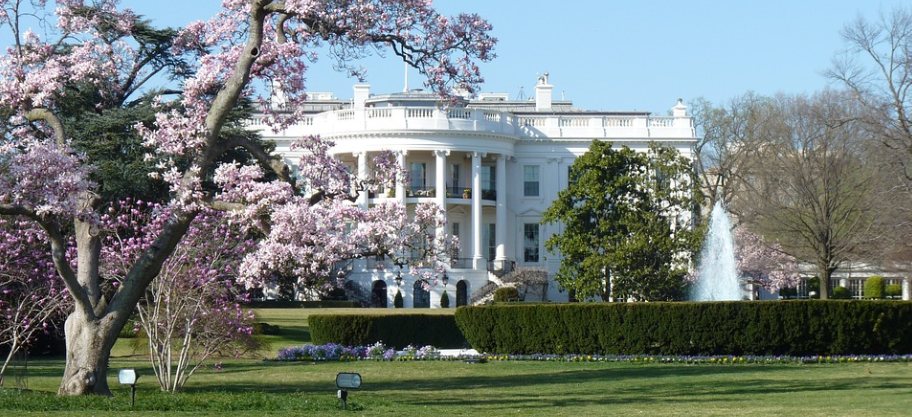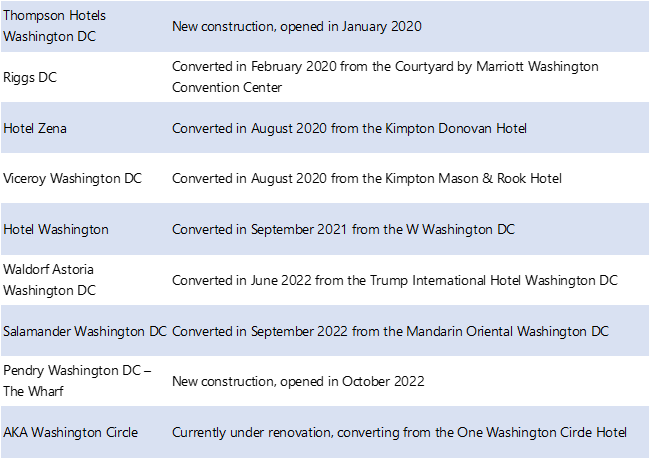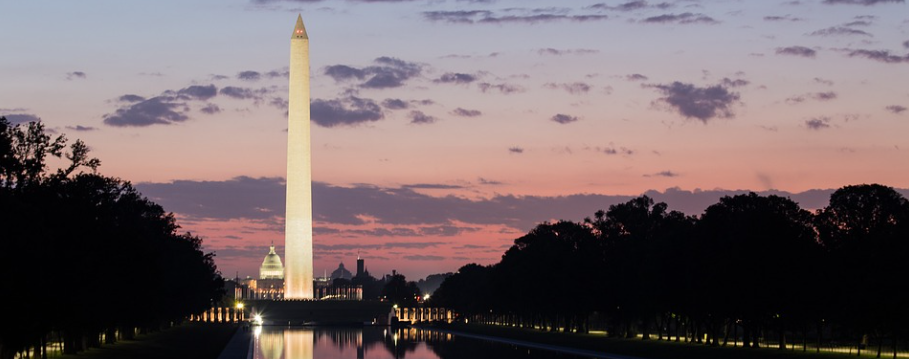Historical Luxury Market Performance
According to data compiled by STR, in recent years, the luxury segment has fallen 2–5% behind the Washington, D.C. market average in occupancy, while luxury rates have paced roughly $150 to $200 above average. This rate difference is largely due to a few luxury hotels that perform at a higher rate threshold than the remainder of the luxury class, including the Four Seasons, the Waldorf Astoria, both Ritz-Carlton properties, the Hay Adams, and the St. Regis. These higher-rated hotels make up 15% of the total luxury room supply in the District.The 2022 market-wide operating performance for District of Columbia hotels was roughly 62%, at an ADR of just above $240. The 2022 RevPAR falls more than $20 below the 2019 level. The luxury hotel segment, which comprises around 30 hotels, also did not fully rebound to the historical 2019 RevPAR levels in 2022. However, ADR for this segment grew to roughly 115% of the 2019 level.

Events such as the Presidential Inauguration and the National Cherry Blossom Festival play a large role in the seasonality rate trends of the District. Furthermore, the International Monetary Fund (IMF) has consistently been a major revenue generator for luxury hotels in particular. The World Bank and IMF host their Annual Meetings in October; this event is held in D.C. every two years and often sells out the District, particularly upper-upscale and luxury hotels, as the attendees comprise foreign dignitaries and banking executives. The 2022 Annual Meetings were originally set to be located in Marrakesh, Morocco; however, the meetings were moved to Washington, D.C. due to COVID-19 concerns.
Prior to the pandemic, ADR peaked in October 2019 at $278.08 for the District, largely due to the IMF event and the strong ADRs certain hotel segments were able to achieve. However, ADR for the District hit a new monthly high of $303.49 in October 2022, largely as a result of the IMF event. The Annual Meetings are expected to be held in Morocco in 2023, which is likely to result in some normalization for D.C.’s October 2023 data. Hoteliers may be able to backfill their rooms in 2023 with other high-rated corporate and meeting business, but this demand segment has yet to fully rebound.
Occupancy performance in Washington, D.C. has lagged many other U.S. cities. The delay in occupancy rebound can be attributed to the slow return to offices within the District, as many employees continue to telework. Moody’s Analytics REIS report estimates that the District ended 2022 at a 14.8% vacancy rate and forecasts that the vacancy rate will remain around 14.0% over the next few years; these rates are up significantly from the pre-pandemic level, which typically bracketed 10.0%. This vacancy forecast is due in large part to commercial tenants downsizing or eliminating office space altogether, while office space supply continues to grow; the REIS report predicts that nearly two million square feet of office space will be constructed over the next three years. Additionally, the federal government and many government contractors have not required employees to return to the office full time. As long as this trend continues, business travel and the related rebound of commercial hotel demand will be impeded.
Changes in Luxury Brands & Supply
The Washington, D.C. luxury hotel landscape has undergone many changes in recent years, including the conversion of existing supply and the addition of new supply. These changes are illustrated below.
The majority of the converted hotels underwent a significant capital investment when they were rebranded to a new luxury product. The only property listed above that did not undergo a major public area and/or guestroom renovation, and is not planned to undergo renovation, is the Waldorf Astoria.
Many of the market’s existing luxury hotels (not listed above) are also under renovation or are reported by ownership/management to be in the planning phases of updates. The continued upgrading of these assets, including many of the converted properties, has benefited the entire segment’s rate growth, and future growth in luxury ADR performance should be supported by continued updates and renovations. Aside from the Pendry in the Wharf neighborhood, no confirmed new luxury supply is in the pipeline for Washington, D.C. We note that there are several speculative additions to luxury supply, many of which have been in the pipeline for years; however, none of these have confirmed construction or opening timelines.

Luxury Hotel Transactions
Prior to 2020, there were very few transactions in the D.C. luxury hotel real estate market, with three occurring in 2018 and only one in 2019. Since March 2020, six luxury hotels in the District have been sold, the most notable being the Trump International Hotel Washington DC (now the Waldorf Astoria Washington DC). In 2022, the Trump Organization sold this property to CGI Merchant Group for $375 million, or $1.4 million per key; this sale was the second highest per-key transaction in the nation for the year.The most recent sale in the market, the Mandarin Oriental Washington DC (now the Salamander Washington DC), took place in September 2022. Given the increase in interest rates over the past several months and the talks of a looming economic recession, luxury hotel transactions are likely to be limited as industry players await more favorable financing terms, despite the availability of undeployed debt. As we move further from the growth opportunities realized in the past two years, the buyer/seller gap is expected to widen.
Conclusion
The luxury segment in Washington, D.C. saw significant month-over-month gains during the second half of 2022, and these increases in occupancy and ADR are expected to continue into the first several months of 2023. However, the slow return to in-office work and business travel at many of the key players in D.C. creates concern for the sustainability of the recent upswing. The lack of the IMF conference in 2023 will restrict ADR growth, and as segmentation normalizes, ADR may decline. However, we expect local luxury hoteliers to revenue-manage properly, maintain adequate staffing levels, and capitalize on many of the recent upgrades at these hotels to buoy ADR gains in the future. Given these factors, the luxury hotel market in Washington, D.C. should reach stabilization by 2025.For more information, contact Caroline Dioso or Chelsey Leffet of our Washington, D.C. team.